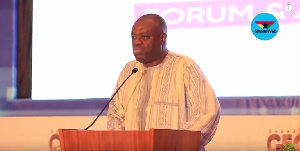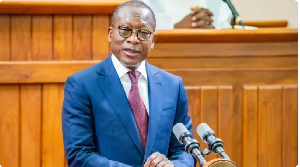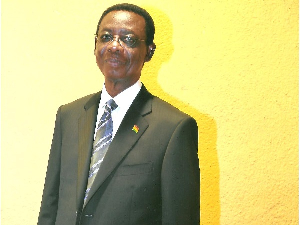Minister of Tourism and Creative Arts, Dr Mohammed Awal, has been asked to ensure clean beaches in the country to attract more domestic and foreign tourists.
Earth Rights, a non-governmental organization working in Tourism and Environment, said they are calling on the Minister to act to keep the beaches clean because filth affects beach or coastal tourism, particularly.
“Honourable Minister, the fact admits of no doubt that when properly managed, beach or coastal tourism attracts large numbers of domestic and international tourists."
“Indeed, many countries blessed with the natural endowment of beaches go to great lengths, including substantial budgetary outlays, to advertise themselves as beach tourism destinations via media channels and at world tourism exhibitions."
“The returns on such investments have been enormous, as borne out by tourism statistics published annually by the World Tourism Organization (UNWTO). The world body estimates that the tourism industry alone could create about four million jobs in sub-Sahara Africa in a decade,” they said in a letter to Dr Awal.
Below is the full letter:
Earth Rights presented the letter to the Minister at a meeting in his office. The Earth Rights delegation was made up of Mr Enimil Ashon, its President, Nana Dr Baa Wiredu, a UNWTO tourism consultant, and Ms Joyce Gyekye, an environmental journalist, both members of the think tank.
DR MOHAMMED IBRAHIM AWAL
HONOURABLE MINISTER FOR TOURISM, ARTS & CULTURE
ACCRA 13th April 2021
Dear Sir
THREAT TO BEACH TOURISM
Earth Rights, an NGO working in Tourism and Environment, joins stakeholders in the tourism sector to welcome you to your new portfolio and to bring to your attention an issue that threatens our very existence as a people, generally, and Ghana’s future as a tourism destination of choice.
Specifically, we are addressing you on the issue of sanitation in the general society, and as it affects beach or coastal tourism, particularly.
Honourable Minister, the fact admits of no doubt that when properly managed, beach or coastal tourism attracts large numbers of domestic and international tourists. Indeed, many countries blessed with the natural endowment of beaches go to great lengths, including substantial budgetary outlays, to advertise themselves as beach tourism destinations via media channels and at world tourism exhibitions.
The returns on such investments have been enormous, as borne out by tourism statistics published annually by the World Tourism Organization (UNWTO). The world body estimates that the tourism industry alone could create about four million jobs in sub-Sahara Africa in a decade.
In a world today that has become very environmentally conscious, however, the operative word in tourism now is sustainability. And there are benefits therefrom. Sustainable coastal and beach tourism retains the economic and social advantages of development while reducing or mitigating any undesirable impacts on the natural, historical, cultural or social environment. In addition, it has the potential to stimulate demand for agriculture, fisheries and food processing.
That, Honourable Minister, is why for a country that attracted 1.13 million visitors and earned USD3.3 billion from one major tourism promotion in 2019, namely the hugely successful flagship Year of Return programme, Earth Rights finds it strange that relatively little attention is being paid to clean beaches by managers of our beaches – the MMDAs. The attention is important as the tourism authorities are planning repeat campaigns in the hope of increasing international receipts to USD2.1 billion annually by 2028,
The World Bank estimates that poor sanitation costs Ghana’s economy around USD290 million each year, equivalent to 1.6% of GDP. No wonder that around 80 per cent of health cases in Ghana are related to sanitation and environmental problems.
The answer lies in holistic waste management. It is our opinion that as Ghana can barely find enough land to establish land fill sites and is being overwhelmed with filth, we should be encouraging waste recycling and waste–to-energy practices at all levels.
Unfortunately, waste–to-energy, which received its highest endorsement with its incorporation in the design of Jubilee House, the seat of government, has not been popularized enough for adoption at the grassroots.
We suggest that your ministry work in co-operation with the three Ministries of Sanitation & Water Resources, Local Government & Rural Development, Environment Science Technology & Innovation to make waste to energy and recycling practices a national campaign. Waste recycling and waste to energy must be made compulsory in the hospitality sector and an extra-curricular activity in schools.
Working towards the attainment of clean beaches attractive enough to both domestic and international tourists is inter-disciplinary. No Ministry, by itself, can do it single-handedly. For cooperation to be effective, we urge that the Inter-Ministerial Task Force on Tourism must be revamped. Its membership must be comprised of the Ministers themselves and in their absence, their Deputies or a policy officer not below the rank of Chief Director. We recall the work done by the late Jake Obetsebi Lamptey who, as Minister of Tourism, realizing the helplessness of his Ministry, working alone, championed the creation of the Task Force. Acknowledging the frustration of waiting at meetings for colleague Ministers who either never showed up or sent token representations, mostly low ranking officers, Jake recommended that the Task Force should be chaired by the Vice President of Ghana. The time has come to revisit this recommendation, to ensure that all notices for meetings of the committee would emanate from Office of the Vice President.
Marine litter makes our beaches aesthetically unappealing to various categories of visitors.
We wish to suggest that any attempt at cleaning the beaches, without taking on board the participation of the many stakeholders in the local communities will bear no lasting fruit. The effort should be complemented by sustainable activities, such as competitive beach sports, including soccer and volleyball, and should provide alternative livelihoods for the local youths.
Furthermore, efforts such as the Coastal Sanitation Project launched by the Ministries of Fisheries and Aquaculture, and later by the Ministry of Tourism in 2018, must have the interest of the locals in mind. We suggest the incorporation of alternative livelihood mechanisms by providing them with entrepreneurial capabilities.
We count on your prompt action on this matter to save Ghana’s health and tourism image
Sincerely
Enimil Ashon
President
Cc
DR KWAKU AFRIYIE
HONOURABLE MINISTER FOR ENVIRONMENT SCIENCE TECHNOLOGY AND INNOVATION
MRS CECILIA DAPAAH
HONOURABLE MINISTER FOR SANITATION AND WATER RESOURCES
HONOURABLE DAN BOTWE
MINISTER FOR LOCAL GOVERNMENT AND RURAL DEVELOPMENT
General News of Wednesday, 21 April 2021
Source: 3news.com
Ensure clean beaches to attract more domestic and international tourists – Awal told
Entertainment












